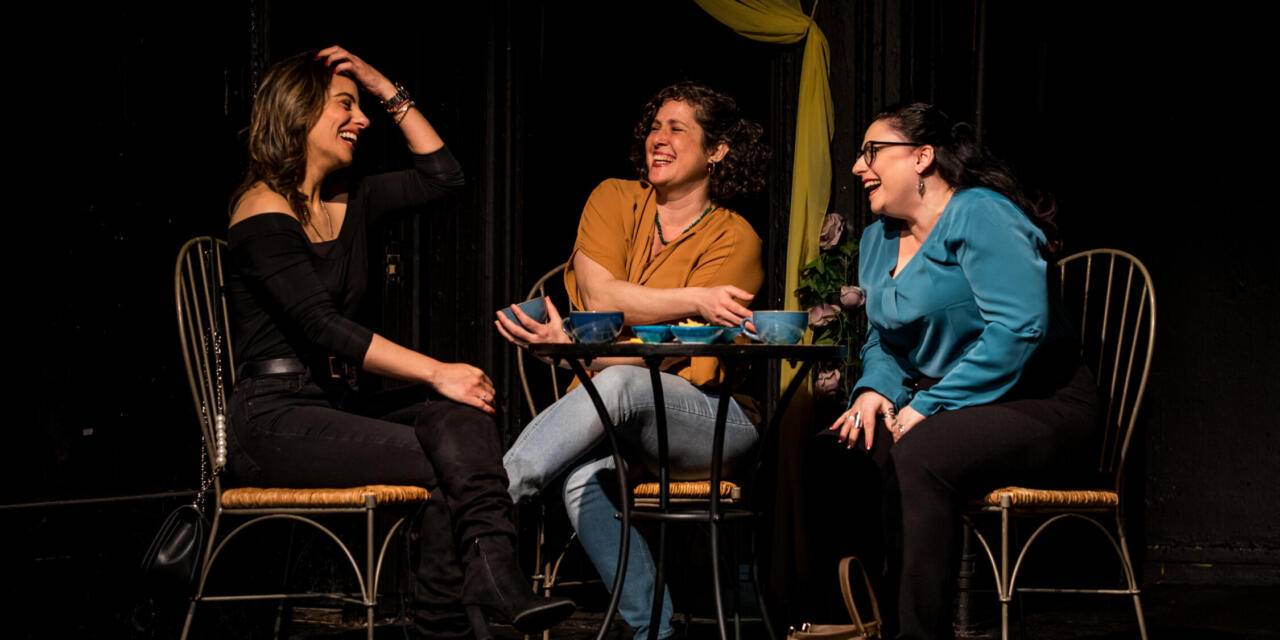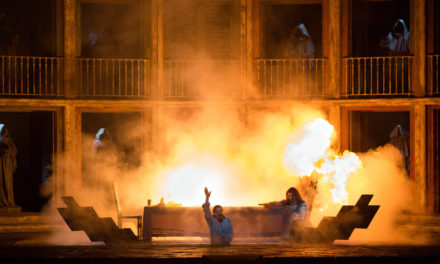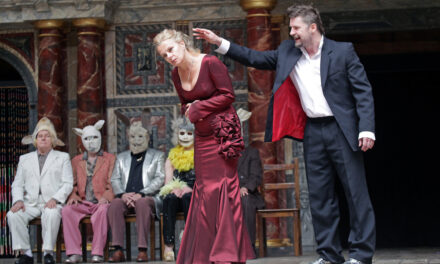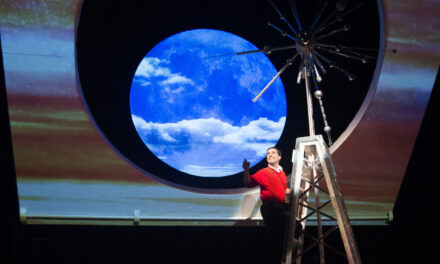Anat Gov’s Best Friends lives in a world of dichotomy. The title is both entirely true and entirely not; the story itself is both distinctly Israeli and wholly universal; the women of the tale are both inarguably magnetic and stunningly repulsive to each other. In this triangulated onslaught, the audience receives story that is humanity in its messiest of incarnations. It’s a piece that is hard to look away from in all respects.
Gov, the beloved Israeli playwright, passed away in 2012 after a long battle with cancer. This near-magnum opus of a play (longest-running comedy in Israel! Winner of the Israel National Theater Award for Best Comedy in 1999!) has made a triumphant New York debut this year, premiering at Rattlestick Theater before conducting an October return engagement at the 14th Street Y. Gov would be pleased with the care given her words.
Best Friends follows three women—preppy Lelly, anxious Tirzah, and rebellious Sophie—across three decades. Their relationship first blossoms in a high school bathroom in the 1960s, the latter two smoking in the stalls and trash-talking the former; from this first confrontation, they become inseparable. That is, at least, until we meet them in the 1990s. Something has driven the trio apart, we know not what, and Lelly has gathered Tirzah and Sophie to her home with the summoning of a “life or death situation.” It comes time to relive, and to decipher exactly what went wrong.
It’s worth noting here that none of these women are particularly good friends to each other. In fact, they’re largely awful throughout the years, sabotaging self-confidence and mocking the difference in their dreams. Still, when tragedy strikes, it is the triad that supports the foundation.
This dynamic is explored with beautifully vulnerable capability by the women’s six actresses: Maya Shoham and Maia Karo as young and adult Lelly, respectively; Addi Gefen and Adi Kozlovsky as Tirzah; and Yael Shavitt and Karin Hershkovitz Kochavi as Sophie. It was remarkable how well each duo played; from their physicality to their speech patternings to their embodiment of learned trauma, it truly felt as if each was the same person. When combined with director Hamutal Posklinsky’s clever staging, this grounding revealed what I believe to be the true exploration of the piece: while friendship may be the vehicle, healing is the destination.
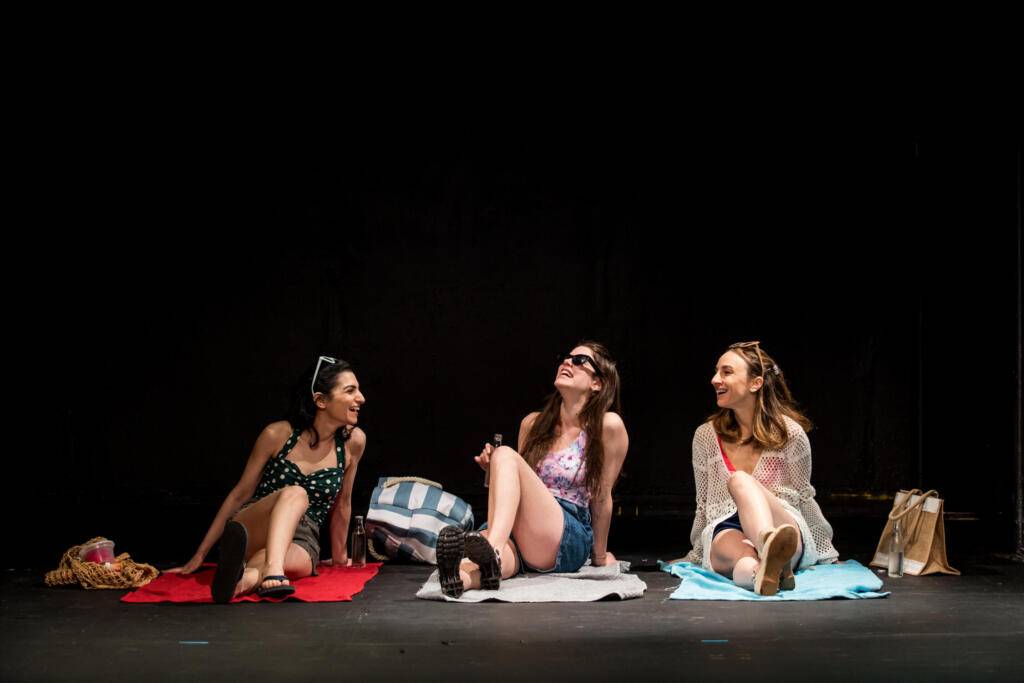
Yael Shavitt (L), Maya Shoham, and Addi Gefen as the young trio in Best Friends. PC: STAV Festival
The appearance and trembling of young Tirzah as the elder fights to defend her life’s choices to the more badass Sophie. Adult Lelly embracing her younger self as the latter cries over her adulterous near-husband. Young Sophie shrieking, breathing in tandem with the older as her son is born. This physical touch between character, this self-awareness of past meeting present, continuously sharpens the line of understanding and blurs the concept of growth. Circuitous movement onstage mimics the circuitous nature of this friend group, given over to severe abandonment issues. It is utterly compelling to watch them work through this, even as one’s stomach roils with disgust at how they treat each other.
Funnily enough, this marriage of naivete and distrust, this pacing of comedy and tragedy, found its most immaculate turn in a discussion of blowjobs. Yes, you read that right. In a debate about blowjobs between the adult semi-friends (enjoyable or not? Is there a technique? Do you owe it to your male partner? Why is that all one can focus on?), a connectivity is found that may even rival the rest of the show. Though much of it owes to Gov’s writing of the sequence, Karo, Kozlovsky, and Herkovitz Kochavi are owed a massive kudos for their living of it.
It is this style that makes Best Friends a bit of a feminist subversion. None of these three are particularly good people throughout their lives. They’re jealous, and manipulative, and possessive, and saboteurs of self and friend. But they are also passionate, and ambitious, and clever, and brave in their volatility. They are humans who speak of sex and love just as much as they speak of the Everly Brothers (“All I Have to Do is Dream” is their anthem) and their children’s names. They are, quite simply, women.
The story itself holds universal, but I would be remiss not to point out its Israeli inception. Every cast member involved in Best Friends is of Israeli birth; the playwright was Israeli; the creatives are Israeli. An undercurrent of the nation’s worries—of the 20th century and now—pulses through the script: Sophie speaks of her sons being drafted, her fear for them; the military state is addressed a multitude of times; the trio brings Torah-flavored humor and query. An audience is aware that they are watching an Israeli tale, but rarely is it brought to the explicit forefront. That provides a power, I find, in simply letting the story be. Letting one see people as people.
In short, Gov would be proud. It’s a marvelous staging.
Best Friends runs at the 14th Street Y through Octobetr 28, 2023, as part of the STAV Festival. For tickets and more information, click here.
This post was written by the author in their personal capacity.The opinions expressed in this article are the author’s own and do not reflect the view of The Theatre Times, their staff or collaborators.
This post was written by Rhiannon Ling.
The views expressed here belong to the author and do not necessarily reflect our views and opinions.

